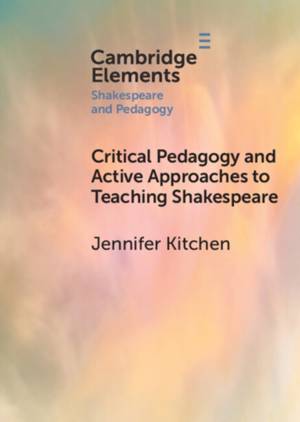
- Afhalen na 1 uur in een winkel met voorraad
- Gratis thuislevering in België vanaf € 30
- Ruim aanbod met 7 miljoen producten
- Afhalen na 1 uur in een winkel met voorraad
- Gratis thuislevering in België vanaf € 30
- Ruim aanbod met 7 miljoen producten
Zoeken
Critical Pedagogy and Active Approaches to Teaching Shakespeare
Jennifer Kitchen
€ 22,95
+ 45 punten
Omschrijving
Active approaches to teaching Shakespeare are growing in popularity, seen not only as enjoyable and accessible, but as an egalitarian and progressive teaching practice. A growing body of resources supports this work in classrooms. Yet critiques of these approaches argue they are not rigorous and do little to challenge the conservative status quo around Shakespeare. Meanwhile, Shakespeare scholarship more broadly is increasingly recognising the role of critical pedagogy, particularly feminist and decolonising approaches, and asks how best to teach Shakespeare within twenty-first century understandings of cultural value and social justice. Via vignettes of schools' participation in Coram Shakespeare School Foundation's festival, this Element draws on critical theories of education, play and identity to argue active Shakespeare teaching is a playful co-construction with learners and holds rich potential towards furthering social justice-oriented approaches to teaching the plays.
Specificaties
Betrokkenen
- Auteur(s):
- Uitgeverij:
Inhoud
- Aantal bladzijden:
- 75
- Taal:
- Engels
- Reeks:
Eigenschappen
- Productcode (EAN):
- 9781108792653
- Verschijningsdatum:
- 7/12/2023
- Uitvoering:
- Paperback
- Formaat:
- Trade paperback (VS)
- Afmetingen:
- 127 mm x 178 mm
- Gewicht:
- 95 g

Alleen bij Standaard Boekhandel
+ 45 punten op je klantenkaart van Standaard Boekhandel
Beoordelingen
We publiceren alleen reviews die voldoen aan de voorwaarden voor reviews. Bekijk onze voorwaarden voor reviews.











